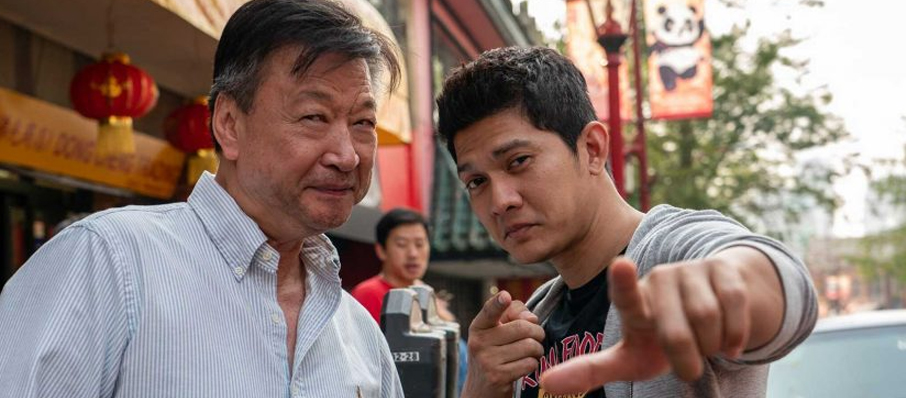He plays the supporting but important role of Mr. Young, who is a friend and ally to Kai Jin (played by Iko Uwais) as his life changes in ways he could never anticipate. Young is Kai’s neighbour and he also owns the local grocery; he’s a grounding force in this fantastic series.
Archive: View Full Article
Author: Brittany Frederick
Tzi Ma is a familiar face to TV fans, who will recognize him for his memorable performances in 24, Hell on Wheels, and other series—but he’s playing a different part in Netflix‘s martial arts drama Wu Assassins.
He plays the supporting but important role of Mr. Young, who is a friend and ally to Kai Jin (played by Iko Uwais) as his life changes in ways he could never anticipate. Young is Kai’s neighbor and he also owns the local grocery; he’s a grounding force in this fantastic series.
That’s not normally the kind of character audiences see from Tzi, who spoke with us about what attracted him to the series, why he feels it’s important for viewers, and what’s next for this always busy and dependable performer.
Learn more in our interview with Tzi Ma below, and stream Wu Assassins season 1 today only on Netflix.
Netflix Life: Wu Assassins is a different project for you; you’re normally an antagonist or some kind of prominent character. So what was your interest in this show?
Tzi Ma: A couple of things. The biggest was John Wirth, because we worked on Hell on Wheels together and the way the man works impressed me. He’s so inclusive and he’s taken such an interest in what we are about, we being the Asian American community. It’s rare. It’s rare anyone from the outside would take an interest in what you’re doing because they should be interested in what they’re doing, right? So the fact that John Wirth has taken that kind of time and interest, and the care he took to execute Hell on Wheels, he was a person that I trusted to work with.
I trusted him in telling a story that’s not going to be just a run of the mill story. Here you have this martial arts supernatural crime drama that takes place in San Francisco’s Chinatown, and normally when you have these genres, Chinatown is just a backdrop. You never really know anything about Chinatown. It’s just a place where these things happen. Now with Wu Assassins, you really see the people in Chinatown and my character’s one of them.
Mr. Young is an ordinary guy in Chinatown, a member of the community. He has a close relationship with Kai; they’re neighbors and live in the same building, and he’s taken him in as a young man that he finds with a lot of honesty. A lot of genuineness, and he really appreciates the fact that this young man is trying to find his way as a chef. Another ordinary person who is under extraordinary circumstances.
It turned out to be the kind of show that I really appreciate, and I have to give all the credit to John Wirth because he doesn’t have to do that…People are going to watch this show, and he was able to use that to tell a much deeper story. And the fact that Mr. Young is a Vietnam vet—how often do you see an Asian-American character who’s a Vietnam vet and not to be seen as the face of the enemy? Probably never.
Wu Assassins doesn’t make Mr. Young a participant in all the supernatural action. So did you keep up with the overall plot, or just the parts that affected your character?
Anything that has something to do with [Asian-Americans], I have to take full interest in, because still today we don’t have enough quantity and quality out there…I think we’re still just a link in a chain. All the things we do are linked like a chain. Whenever one thing happens, it affects all the other links in the chain, so I have full interest.
I look at all the stuff John’s written and give John props. He will include you [and ask] what do you think of this? Will it reflect well? He’s open to that and he really gets help in the writers’ room. There are several Asian-American writers, and all the writers will make sure we’re represented truthfully.
How does Mr. Young compare to the other memorable characters you’ve portrayed in past shows like 24 or The Man in the High Castle?
What I appreciate is the fact that I am an ordinary character, because if you look at all the stuff you’ve mentioned, I’m extraordinary in every one of them. I’m powerful—I’m a general, a president, an ambassador, I’m in the public eye. All these high-powered, influential characters, and they’re really fun, but it’s also fun to be ordinary. How do you become ordinary?
Mr. Young says some of the darndest things so I enjoy that. I enjoyed the fact that I didn’t have to do any of the fighting, because I just did have a fight scene in [USA’s upcoming series] Treadstone and I hurt for a week after that fight. I’m really happy to be that guy that doesn’t have to carry all the physical weight. To be a regular person is kind of nice every once in a while.
Wu Assassins
Do you have favorite Wu Assassins scenes that speak to the qualities you mentioned? Which moments stood out as you were filming?
I would have to say the scene between Mr. Young and Kai, when Kai tries to take matters into his own hands to poison Uncle Six after his defeat by Six. There’s so much depth in that scene. It’s a lesson about choices one makes. Will your action justify the end? Mr. Young gives a warning to Kai: if you go down this road, it may not be the best path.
He does that by recounting his own experience in the Vietnam War, where a man in his platoon dies in his arms because he had been poisoned. The fact that this dying man was from the state of Georgia has a certain meaning to it. It tells the audience he is not the face of the enemy.
The fact that Kai knowingly asked Mr. Young to help him get the material to concoct the poison [and] makes him an accessory to murder was another conflict, another layer to play that was enriching. The horrors of war and the conditions of war were also introduced to the audience in that short monologue as well, and that speech was written by John Wirth.
You spoke about the authentic portrayal of Asian-Americans in Wu Assassins. What’s your overall opinion of Asian-American representation on TV today?
They’re not Asian. They’re Asian-Americans. That’s the key. There are a lot of Asian characters around, and Wu Assassins is a good example of a lot of Asian-American characters—the people who are born in the States that are already second, third, fourth [or] fifth generation Americans. It’s really valuable and poignant that we as a community are not seen as perpetual foreigners
In that sense, it’s really rewarding to see characters such as Awkwafina’s character Billi in [his upcoming film] The Farewell. You really have to redefine what is all-American now because what is the all-American person? You look at that performance and you look at performances by Li Jun Li, Lawrence Kao, and Lewis Tan in Wu Assassins; they are Americans. They have all the baggage and all the advantages of being one.
I want to see more, because we really want the audience to know America is this tapestry of all these different colors and pieces, and that’s what excites me.
You’re an incredibly busy actor. So what else does Tzi Ma have going on after Wu Assassins?
You’ve got Wu Assassins. You’ve got The Farewell, which is out in theaters right now. I just finished this film with Alan Yang, his feature film debut [that’s] also on Netflix called Tigertail; I think that’s something people should be paying attention to. That’s a really wonderful story.
I have a film that I just finished called A Shot Through the Wall; I think that’s an interesting film that people will want to follow. It’s about this Chinese-American rookie cop who mistakenly shot an African-American man in Brooklyn. The bullet ricocheted off one floor and bounced off the wall and hit this man on another floor.
That’s a really interesting film to look at, in terms of race relations and how Black Lives Matter influenced that narrative. How our country’s own racism pits minorities against each other. The film also examines an interracial relationship, and that is interesting to see. And Treadstone is coming out on USA Network; that should be awesome.


